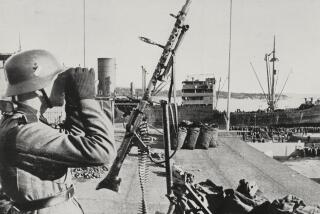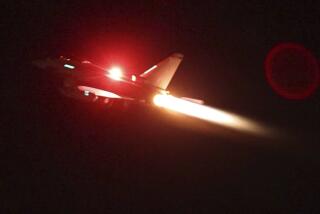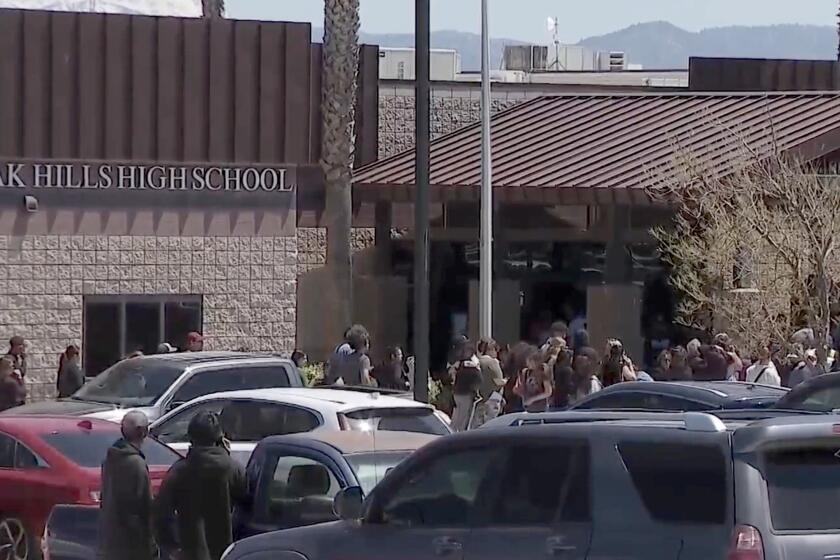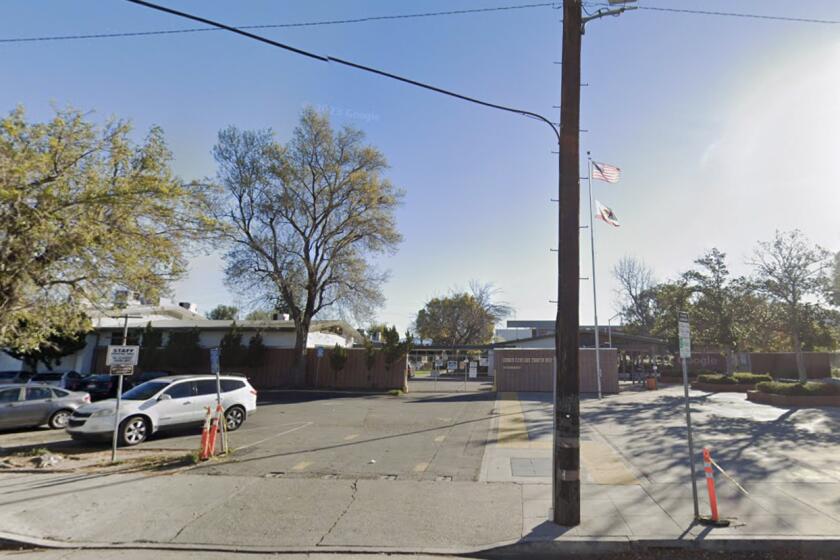A Cold War Hawk Who Set the Stage for Peace
WASHINGTON — When Ronald Reagan entered the White House in 1981, the United States faced two major foreign policy challenges: the generation-long Cold War with the Soviet Union, and an unfamiliar new threat from militant Islamic movements, which had seized power in Iran and sought to end American influence in the Middle East.
To critics’ surprise, Reagan made major progress toward ending the Cold War; the Berlin Wall, the stark symbol of Europe’s division between communism and democracy, came down less than a year after he left office.
FOR THE RECORD: Branch Rickey —An article in Sunday’s Section A about former President Reagan’s foreign policy included bracketed material that characterized Branch Rickey as a legendary baseball manager. Although Rickey was at one time a manager, he is best known for his later front office career as an executive with the St. Louis Cardinals and the Brooklyn Dodgers.
But in the struggle against Islamic militants who launched terrorist attacks against Americans, Reagan’s accomplishments were more ambiguous. In 1986, Reagan sent military aircraft to attack Libya after concluding that its leader, Col. Moammar Kadafi, had ordered a terrorist attack against American troops in Germany. But another military intervention, in Lebanon in 1983, ended in ignominy after a suicide bomber killed 241 U.S. service personnel in Beirut.
Reagan’s presidency reached its low point as a byproduct of terrorism, when he approved an abortive attempt to ransom American hostages in Lebanon through secret weapons sales to Islamic fundamentalist Iran — a scheme that led to the Iran-Contra scandal over the arms deals and secret payments to right-wing Nicaraguan rebels with the proceeds.
Still, to his admirers and to an increasing consensus of historians, Reagan will be remembered less for his failings in what would later be called a “war on terrorism,” and more for his success in bringing the Cold War to an end.
At the beginning of his presidency, the hawkish Reagan, who two years later declared the Soviet Union an “evil empire,” announced a massive buildup of U.S. nuclear weapons and vowed to roll back communism around the world. But when he left office eight years later, communism was beginning to collapse, the superpower conflict was heading toward an improbably peaceful end and the new, little-understood threat from Islamic militants was only beginning to emerge.
Reagan didn’t “win” the Cold War single-handedly; he was only one of nine presidents who led the United States during the long east-west conflict from 1947 to 1989, from Harry S. Truman to George H.W. Bush.
But Reagan did play a central role in ending the Cold War, and by the time of his death 15 years after he left the Oval Office, even some of his most dogged critics were willing to grant him credit.
“Reagan’s contribution to ending the Cold War was comparable to [President] Nixon’s contribution to opening up China,” said Walter LaFeber, a historian at Cornell University who has long been critical of Reagan. “Politically, to have somebody of Reagan’s ideology do this was very important. It would have been very difficult for [a Democrat] to do it.”
Reagan’s presidency, fiercely controversial in its day, can still start arguments. But at least among scholars, the debate on Reagan is no longer over whether the conservative president had a serious foreign policy strategy or if he contributed to the end of the Cold War.
Instead, they now debate a list of more subtle questions: How much credit does Reagan deserve compared with Mikhail S. Gorbachev, the Soviet reformer? Did Gorbachev change communism’s course because he feared Reagan’s military buildup, or because he yearned for Western technology and economic growth? And which Reagan was more important in ending the Cold War, the grim missile-builder of the first term or the genial peacemaker of the second?
Those questions may long remain unanswered. But most historians now concede that Reagan played a central role in directing the epochal events of the 1980s, and that is a significant shift in scholarly opinion.
Even Arthur M. Schlesinger Jr., the Democratic Party’s unofficial historian-laureate, acknowledges that Reagan deserves “considerable credit” for the end of the Cold War, although he still thinks the man’s domestic policies were “a disaster.”
“It is probably true that Reagan’s intensification of the arms race hastened the collapse of the Soviet economy,” Schlesinger wrote in a magazine piece several years after Reagan left office. “In a reversal that did him enormous credit, he outdistanced his own national security bureaucracy in taking Mikhail Gorbachev seriously and in moving to end the Cold War.”
“There really has been a discernible change,” said John Lewis Gaddis of Yale University. “Historians are taking Reagan much more seriously . There are very few who would still say what most were saying when he left office, which is that he was a cipher when it came to foreign policy. He was much more of a force than people gave him credit for at the time.
“Consider the way things were when he came into office and the way things were when he left — totally different,” Gaddis added. “The Berlin Wall came down less than a year after he left. That fact alone means we have to get over our preconceptions about this guy and acknowledge that something substantive occurred.”
For years, Reagan-watchers — including some of the president’s own aides — described him as an essentially passive leader, a man who had strong convictions but paid little attention to the details of his own policies.
But that simplistic portrait was complicated in 2001 when Kiron K. Skinner, a young historian at Carnegie Mellon University, published the texts of many of the hundreds of radio talks Reagan delivered — mostly written without speechwriters — in the late 1970s.
“They were very impressive,” LaFeber said. “I wasn’t ready for something like this.” The radio scripts “surprised a lot of people,” Gaddis said. “Whatever you think of the level of sophistication of the ideas, it’s a remarkable performance for someone who was thought to rely heavily on speechwriters.” In the radio scripts and other speeches, Reagan laid out a vision of the fall of communism that sounded, at the time, utopian and naive.
“Communism is a temporary aberration which will one day disappear from the Earth because it is contrary to human nature,” he said.
In Reagan’s view, an arms race with the Soviet Union was a good thing — because it would strain the inefficient Soviet economy and prompt the Russians to negotiate for arms reductions.
It “would be of great benefit to the United States if we started a buildup” of nuclear weapons, he told the Washington Post during the 1980 campaign.
Some Reaganites, such as former arms-control agency director Kenneth L. Adelman, have argued that Reagan’s massive defense buildup — especially his Strategic Defense Initiative (“Star Wars”), or SDI, the project to build weapons that could block an attacker’s nuclear missiles — was key to the Soviet Union’s collapse.
Liberals such as LaFeber disagree. They contend that economic competition was a more important factor, and give Gorbachev credit for recognizing that the Soviet Union could not compete with the West without sweeping political reforms.
They argue that Reagan’s most important move was not his defense buildup, but his decision in 1984 to offer Soviet leaders economic cooperation in place of military competition.
The liberal view is endorsed by Anatoly F. Dobrynin, the Soviet ambassador in Washington during most of the Reagan years, who wrote in his memoirs: “If the president had not abandoned his hostile stance for a more constructive one during his second term, Gorbachev would not have been able to launch his reforms . Quite the contrary. Gorbachev would have been forced to continue the conservative foreign and domestic policies of his predecessors in defense of the nation against America.”
But most historians have come to believe that it was the combination of the two — Reagan’s initial toughness toward Moscow, followed by his willingness to ease up — that made the end of the Cold War possible.
“Obviously, it was some combination of both,” Gaddis said. “The defense buildup and SDI certainly had a profound psychological impact on the Russians, who just could not see how they were going to compete . .
“The hard line paid off. But equally important was the extended hand as soon as there was someone on the other side to grasp it. There was no one to grasp it until Gorbachev. Reagan deserves credit for recognizing that Gorbachev was a different kind of leader.”
In fact, Reagan was seeking arms reduction talks with the Soviets even before Gorbachev came to power in 1985. In early 1983, Reagan authorized Secretary of State George P. Shultz to open talks with Moscow to reduce tensions between the two superpowers.
Reagan himself met secretly with Dobrynin in February 1983 to confirm that he was interested in rapprochement, only three weeks before the famous “evil empire” speech. The meeting was kept secret in part to avoid arousing hawks in Reagan’s own administration, journalist Don Oberdorfer reported in a 1991 book on Reagan’s U.S.-Soviet diplomacy, “The Turn.”
Even then, Reagan and Shultz believed — correctly, as it turned out — that Soviet leaders might be searching for a path toward major change. In 1983, they addressed their secret messages to then-Soviet leader Yuri V. Andropov, but Andropov was ailing and died in 1984. His successor, Konstantin U. Chernenko, ruled for only 13 months before dying in 1985.
Reagan’s record includes another paradox. Conservatives such as Adelman credit SDI with frightening the Soviets into making concessions. But Reagan himself never conceived of SDI as a bludgeon to stampede the Soviets, aides and scholars have concluded. Instead, they believe, he was sincere in offering to share the technology with Moscow — as part of his own utopian desire to rid the world of nuclear weapons entirely.
“Ronald Reagan was a closet antinuclear guy, and none of us understood it,” Adelman said later.
“Reagan’s nuclear abolitionism is one of the most intriguing things about him,” Gaddis said. “He’s the first and, so far, only American president to believe in this, although the Bush administration is coming back around in the same direction.
“College undergraduates today see Reagan as a hero for ending the Cold War,” he noted. “They are too young to have had a sense that he seemed threatening to many people at the time . When I lecture on Reagan, the kids are enthusiastic — and their parents are horrified.
“The remarkable thing about Reagan is the fact that in so many different areas, he resisted the Cold War’s conventional wisdom,” Gaddis said. “Did he resist it because he was sophisticated enough to see how absurd it was — or because he was so dumb he didn’t know what the conventional wisdom was? That’s the question.”
But on that, even LaFeber, the longtime Reagan critic, is willing to give the late president his due:
“As [legendary baseball manager] Branch Rickey said, luck is the residue of design.”
More to Read
Start your day right
Sign up for Essential California for news, features and recommendations from the L.A. Times and beyond in your inbox six days a week.
You may occasionally receive promotional content from the Los Angeles Times.







